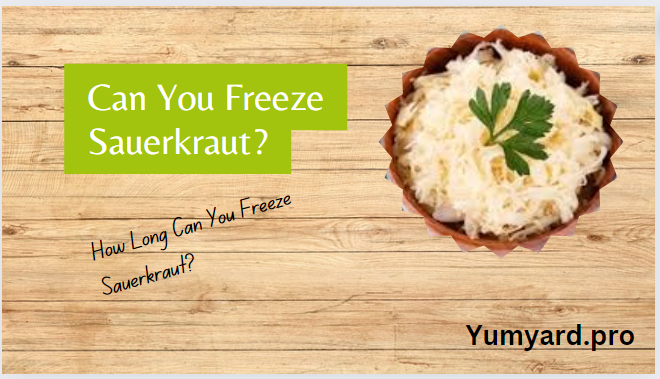Yes, you can freeze sauerkraut, and it’s a great way to preserve this delicious fermented food if you’ve got more than you can eat right away. I’ve been making and cooking with sauerkraut for years, and knowing how to store it properly is key to maintaining its flavor, crunch, and probiotics. Freezing sauerkraut is not only possible but can be a smart move if you want to extend its shelf life beyond the fridge.
In this article, I’ll guide you through the correct steps to freeze sauerkraut, so it stays fresh and flavorful. We’ll dive into the best practices, how freezing impacts the texture, and what you can expect when you thaw your kraut. Let’s get started with the details!
Can You Freeze Sauerkraut? A Quick Guide to Freezing Sauerkraut
Yes, you can freeze sauerkraut, and it’s quite simple! While freezing may affect the texture slightly, especially after long periods, the flavor and health benefits largely remain intact. To freeze sauerkraut properly, make sure you store it in airtight containers or freezer bags to prevent freezer burn. When done correctly, frozen sauerkraut can last for several months.
Freezing sauerkraut is a great option if you have more than you can consume in a short period, or if you’re prepping ahead for meals. Whether you’re freezing sauerkraut that’s been freshly made or store-bought, follow the right steps to preserve its tangy flavor and crunch.
Read it Also: Can You Freeze Brie? The Ultimate Guide to Storing Brie Cheese
How to Freeze Sauerkraut Properly
Freezing sauerkraut involves a few steps to ensure the best results. Here’s how to freeze it without compromising the quality:
Step 1: Use the Right Container
Airtight containers or freezer bags are the best options for freezing sauerkraut. Before placing the kraut in the container, ensure that it’s completely cooled and drained of excess liquid. Sauerkraut holds a lot of water, which can expand when frozen, so draining it helps prevent freezer burn.
Step 2: Remove Excess Air
When using freezer bags, make sure to remove as much air as possible to avoid ice crystals forming, which can affect the texture. For optimal results, spread the sauerkraut in a single layer in the freezer bags, flattening them to remove air. This step also makes it easier to thaw in portions.
Can You Freeze Sauerkraut After Opening?
Yes, you can freeze sauerkraut after opening it, and the process is the same. Be sure to transfer it to a freezer-safe container or bag if it’s in a glass jar. Once opened, the shelf life of sauerkraut in the fridge is limited, so freezing is a great way to avoid spoilage and extend its life.
Freezing after opening doesn’t impact the flavor or nutritional benefits, but like all fermented foods, the texture may change slightly after freezing. It will still be delicious when thawed, perfect for cooked dishes like borscht or as a tangy topping.
How Long Can You Freeze Sauerkraut?
Sauerkraut can be frozen for up to 8-12 months, maintaining much of its original flavor and nutritional profile. However, the longer it stays frozen, the more the texture may degrade. To ensure the best quality, try to use frozen sauerkraut within six months.
Always check for obvious signs of spoilage after thawing, like an off smell, color changes, or mold growth. While freezing generally halts bacterial growth, it’s important to inspect your kraut for spoilage before consuming it.
Can You Freeze Sauerkraut After It’s Been Cooked?
Yes, you can freeze sauerkraut after it’s been cooked, especially if it’s part of a larger dish like a stew or casserole. Cooked sauerkraut tends to freeze well because the heat breaks down some of the cell walls, reducing the risk of a mushy texture after thawing.
When freezing cooked sauerkraut, be sure to let it cool completely before packing it into freezer bags or containers. Label it with the date, so you know how long it’s been in the freezer. Cooked sauerkraut dishes, like sauerkraut soup or borscht, can last up to 3 months in the freezer.
Read it Also: Can You Freeze Mozzarella Cheese? A Complete Guide
What to Expect When Thawing Sauerkraut
Thawed sauerkraut can have a slightly different texture compared to fresh, but it’s still packed with flavor and probiotics. The kraut might be a little softer, especially if it’s been frozen for an extended period. Thawing can be done in the fridge over a few hours or quickly in cold water if you’re short on time.
If you notice greenish specs or an off smell after thawing, it could be a sign of spoilage, and you should discard it. Otherwise, thawed sauerkraut is safe to use in cooked dishes, and the flavor remains tangy and sharp.
Tips for Freezing Sauerkraut Successfully
- Use airtight containers or freezer bags to avoid freezer burn.
- Flatten freezer bags to remove excess air and for easier storage.
- Label the containers with the date to keep track of the freezing time.
- Portion the sauerkraut before freezing for easier use later.
Sauerkraut Recipe: How to Make and Freeze Sauerkraut
Making your own sauerkraut is a simple process that requires only a few ingredients, and it’s easy to freeze for long-term storage.
| Ingredient | Quantity |
|---|---|
| Cabbage (green or red) | 1 medium head |
| Salt | 1.5 tablespoons per pound of cabbage |
| Caraway seeds (optional) | 1 tablespoon |
Instructions:
- Shred the cabbage and mix with salt. Let it sit for a few hours to release water.
- Pack the cabbage tightly into glass jars, pressing down to remove air.
- Let it ferment for 3-4 weeks at room temperature before moving to the fridge.
- Once fermented, freeze any leftover sauerkraut in portions to use later.
Conclusion: Freezing Sauerkraut the Right Way
Freezing sauerkraut is a great option if you want to extend its shelf life while preserving its unique flavor and health benefits. Whether you’re storing leftover kraut or making a big batch for later use, follow the steps outlined here to keep your sauerkraut fresh, tasty, and full of probiotics.
FAQs
1. Can you freeze sauerkraut in glass jars?
Yes, but make sure to leave room for expansion during freezing to avoid cracking the glass.
2. Does freezing sauerkraut kill the probiotics?
Some probiotics may be lost, but most survive the freezing process.
3. How do you thaw frozen sauerkraut?
Thaw in the fridge for a few hours or use cold water for a quicker option.
4. Can you freeze homemade sauerkraut?
Absolutely, and it freezes just as well as store-bought sauerkraut.
5. Can frozen sauerkraut be used in raw dishes?
Yes, but the texture might be softer, so it’s best suited for cooked dishes.
- All You Can Eat Sushi | Your Guide to the Best Unlimited Sushi Restaurants - October 17, 2024
- Can You Make Brownies Without Eggs? A Complete Guide to Eggless Brownies - October 16, 2024
- Cowboy Soup Recipe: Hearty, Flavorful, - September 21, 2024

